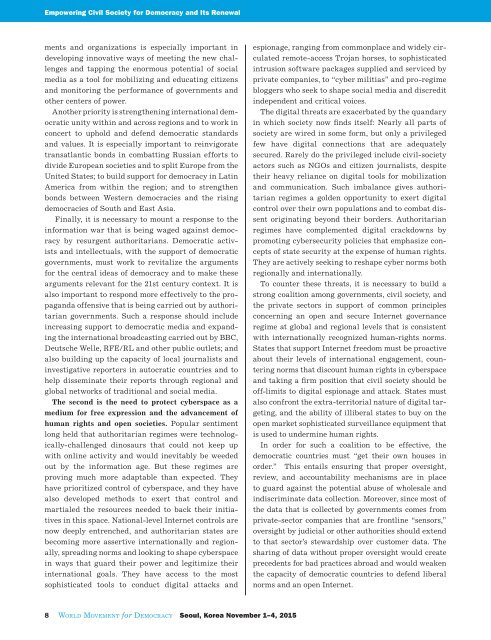Create successful ePaper yourself
Turn your PDF publications into a flip-book with our unique Google optimized e-Paper software.
Empowering Civil Society for Democracy and Its Renewal<br />
ments and organizations is especially important in<br />
developing innovative ways of meeting the new challenges<br />
and tapping the enormous potential of social<br />
media as a tool for mobilizing and educating citizens<br />
and monitoring the performance of governments and<br />
other centers of power.<br />
Another priority is strengthening international democratic<br />
unity within and across regions and to work in<br />
concert to uphold and defend democratic standards<br />
and values. It is especially important to reinvigorate<br />
transatlantic bonds in combatting Russian efforts to<br />
divide European societies and to split Europe from the<br />
United States; to build support for democracy in Latin<br />
America from within the region; and to strengthen<br />
bonds between Western democracies and the rising<br />
democracies of South and East Asia.<br />
Finally, it is necessary to mount a response to the<br />
information war that is being waged against democracy<br />
by resurgent authoritarians. Democratic activists<br />
and intellectuals, with the support of democratic<br />
governments, must work to revitalize the arguments<br />
for the central ideas of democracy and to make these<br />
arguments relevant for the 21st century context. It is<br />
also important to respond more effectively to the propaganda<br />
offensive that is being carried out by authoritarian<br />
governments. Such a response should include<br />
increasing support to democratic media and expanding<br />
the international broadcasting carried out by BBC,<br />
Deutsche Welle, RFE/RL and other public outlets; and<br />
also building up the capacity of local journalists and<br />
investigative reporters in autocratic countries and to<br />
help disseminate their reports through regional and<br />
global networks of traditional and social media.<br />
<strong>The</strong> second is the need to protect cyberspace as a<br />
medium for free expression and the advancement of<br />
human rights and open societies. Popular sentiment<br />
long held that authoritarian regimes were technologically-challenged<br />
dinosaurs that could not keep up<br />
with online activity and would inevitably be weeded<br />
out by the information age. But these regimes are<br />
proving much more adaptable than expected. <strong>The</strong>y<br />
have prioritized control of cyberspace, and they have<br />
also developed methods to exert that control and<br />
martialed the resources needed to back their initiatives<br />
in this space. National-level Internet controls are<br />
now deeply entrenched, and authoritarian states are<br />
becoming more assertive internationally and regionally,<br />
spreading norms and looking to shape cyberspace<br />
in ways that guard their power and legitimize their<br />
international goals. <strong>The</strong>y have access to the most<br />
sophisticated tools to conduct digital attacks and<br />
espionage, ranging from commonplace and widely circulated<br />
remote-access Trojan horses, to sophisticated<br />
intrusion software packages supplied and serviced by<br />
private companies, to “cyber militias” and pro-regime<br />
bloggers who seek to shape social media and discredit<br />
independent and critical voices.<br />
<strong>The</strong> digital threats are exacerbated by the quandary<br />
in which society now finds itself: Nearly all parts of<br />
society are wired in some form, but only a privileged<br />
few have digital connections that are adequately<br />
secured. Rarely do the privileged include civil-society<br />
actors such as NGOs and citizen journalists, despite<br />
their heavy reliance on digital tools for mobilization<br />
and communication. Such imbalance gives authoritarian<br />
regimes a golden opportunity to exert digital<br />
control over their own populations and to combat dissent<br />
originating beyond their borders. Authoritarian<br />
regimes have complemented digital crackdowns by<br />
promoting cybersecurity policies that emphasize concepts<br />
of state security at the expense of human rights.<br />
<strong>The</strong>y are actively seeking to reshape cyber norms both<br />
regionally and internationally.<br />
To counter these threats, it is necessary to build a<br />
strong coalition among governments, civil society, and<br />
the private sectors in support of common principles<br />
concerning an open and secure Internet governance<br />
regime at global and regional levels that is consistent<br />
with internationally recognized human-rights norms.<br />
States that support Internet freedom must be proactive<br />
about their levels of international engagement, countering<br />
norms that discount human rights in cyberspace<br />
and taking a firm position that civil society should be<br />
off-limits to digital espionage and attack. States must<br />
also confront the extra-territorial nature of digital targeting,<br />
and the ability of illiberal states to buy on the<br />
open market sophisticated surveillance equipment that<br />
is used to undermine human rights.<br />
In order for such a coalition to be effective, the<br />
democratic countries must “get their own houses in<br />
order.” This entails ensuring that proper oversight,<br />
review, and accountability mechanisms are in place<br />
to guard against the potential abuse of wholesale and<br />
indiscriminate data collection. Moreover, since most of<br />
the data that is collected by governments comes from<br />
private-sector companies that are frontline “sensors,”<br />
oversight by judicial or other authorities should extend<br />
to that sector’s stewardship over customer data. <strong>The</strong><br />
sharing of data without proper oversight would create<br />
precedents for bad practices abroad and would weaken<br />
the capacity of democratic countries to defend liberal<br />
norms and an open Internet.<br />
8 World Movement for Democracy Seoul, Korea November 1–4, 2015


